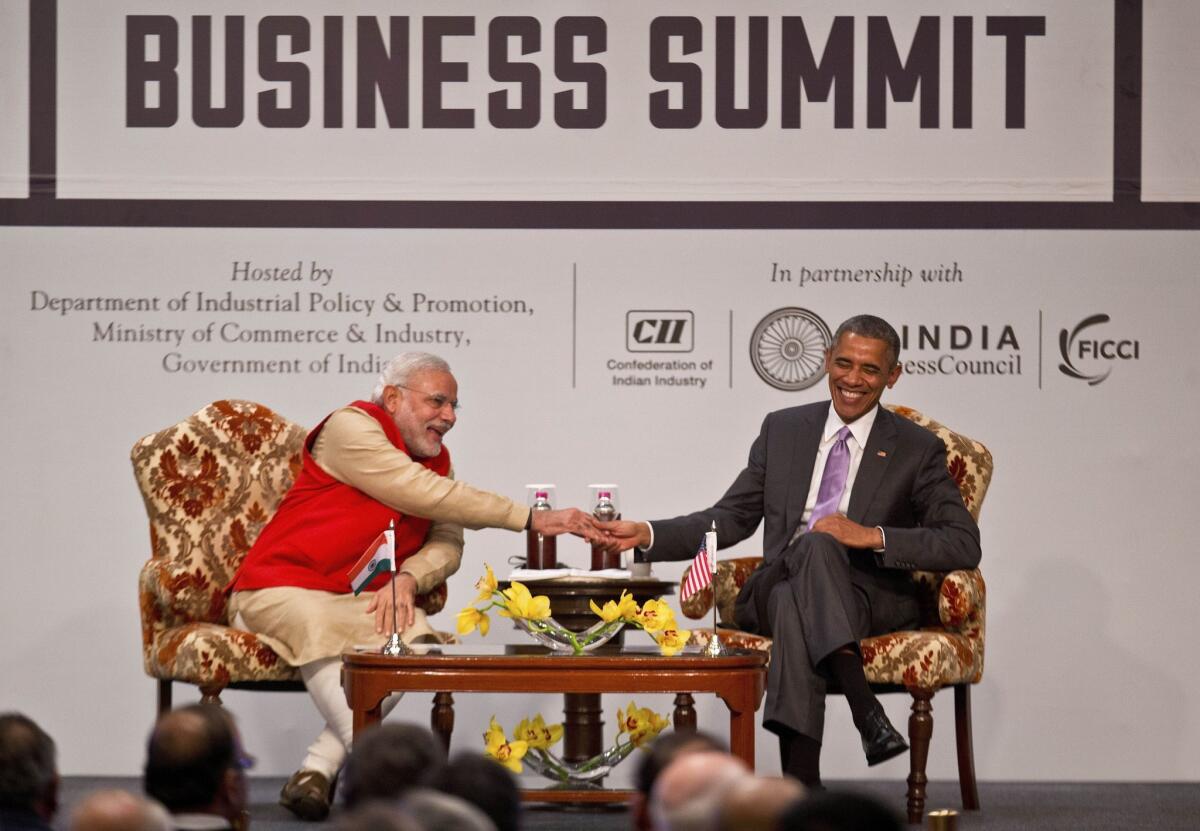Obama seeks to mine ‘untapped potential’ in U.S.-India relationship

President Obama vowed Monday to accelerate U.S. trade and investment in India, saying both nations need to do more to capitalize on the “untapped potential” in a relationship that could define economic and environmental health in both countries.
“In our globalized world, the fortunes of the United States and the fortunes of India are inextricably linked. We can grow and we can prosper together,” Obama told a group of business leaders on Monday during his second day of a trip to New Delhi. “We’re moving in the right direction. The U.S.-India economic relationship is also defined by so much untapped potential. … I think everybody here will agree we’ve got to do better.”
Obama announced a series of new trade initiatives aimed at boosting defense and technology exports and touted progress on a stalled nuclear power deal and renewable energy investment.
His remarks during his three-day stop in India also included a polite push for Indian officials and the executives gathered at the Taj Palace hotel to ensure the rush to develop is both “environmentally sound” and “inclusive.”
“Growth cannot just be measured by the aggregate. It can’t just be measured by GDP, it can’t just be measured by the bottom line on a balance sheet,” Obama said. “Growth in the end has to make people’s lives better in real tangible and lasting ways.”
Before the public meeting, Obama and Prime Minister Narendra Modi met privately with nearly 30 chief executives from U.S. and Indian companies. The CEOs in attendance included Robert Iger of Walt Disney Co., PepsiCo’s Indra Nooyi, Sacramento Kings owner Vivek Ranadive, Honeywell’s Dave Cote, Ahmad Chatila of SunEdison and Daniel Roderick of Westinghouse.
Westinghouse is among those that may benefit from what Obama dubbed a “breakthrough understanding” in stalled negotiations over U.S. companies’ push to build nuclear power plants in India. On Sunday, the two sides said they had resolved two key sticking points, accounting for the nuclear material produced by U.S. companies and liability in case of an accident.
U.S. officials cast the agreement as a step toward moving India off fossil fuels – a key aim in the Obama administration’s climate change policy – and expanding access to electricity to the 300 million Indians without it.
One summit attendee called the discussion promising.
“The dialogue was comforting, reassuring and genuine,” said Nishith Desai, head of an advisory law firm in Mumbai that represents U.S. and Indian clients. “It appeared both the U.S. and India need each other and want to do business.”
“The breakthrough in the nuclear deal really made people believe that both parties are more flexible than ever,” he added.
That progress aside, Obama’s trip has largely been a show of grand ceremony and gestures aimed at deepening U.S.-India relations under the leadership of the popular new prime minster. Leaders began the trip by focusing largely on areas of agreement, and Obama had so far avoided commenting on issues of extreme poverty or human rights.
On Monday, he addressed the issues delicately in front of the host. He heaped praise on Modi’s economic development plans, which include a push to clean up the street and improve sanitation.
“I know the prime minister has even taken to sweeping the street himself and the CEOs are following his lead,” he said. “We might have to try that in the United States.”
Staff writer Shashank Bengali in New Delhi contributed to this report.
For more White House coverage, follow @khennessey.
More to Read
Sign up for Essential California
The most important California stories and recommendations in your inbox every morning.
You may occasionally receive promotional content from the Los Angeles Times.











